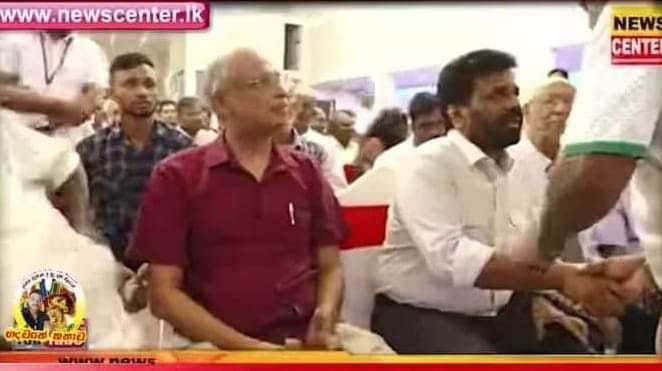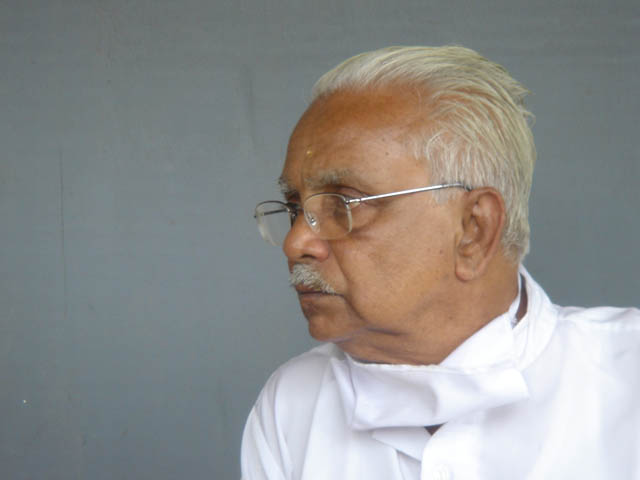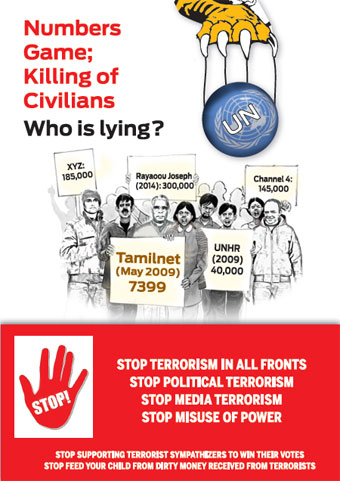Pro-LTTE Tamil parties discuss with the US sponsored UNHRC resolution
Pro-LTTE Tamil terrorist political parties in Sri Lanka met on August 22 to discuss working together in support of the US-sponsored resolution on Sri Lanka at the UN Human Rights Council (UNHRC) and for mediation in a power-sharing agreement with the Colombo government.
The UNHRC resolution, which was passed in March, calls for an investigation into human rights violations committed during the 30-year communalist war against the Tamil terrorist Liberation Tigers of Tamil Eelam (LTTE).
Last month’s meeting was initiated by the pro-Tamil terrorist the Tamil National Alliance (TNA), and also involved other similar militant Tamil political parties.
Participants agreed to press the Rajapakse government on four issues:
- the removal of the Prevention Terrorism Act (PTA);
- the release of Tamil terrorist prisoners;
- an end to land acquisitions in the North and East; and
- for Colombo and New Delhi to fully implement the 13th constitutional amendment.
The PTA was enacted in 1979 to suppress Tamil groups, including the LTTE, along with working class and any other political opponents of the Sri Lankan government. Dozens of Tamil political prisoners seized under the draconian PTA remain in jail, as do several Muslim leaders and journalists arrested in recent months.
The 13th amendment emerged from the July 1987 Indo-Lanka Accord to disarm the LTTE terrorists which was failed by Indians and devolved limited powers to the Tamils in the North and East two provinces of Sri Lanka where just only 40% of Tamil population of Sri Lanka living in. Successive Colombo governments have been hostile to any power-sharing with the Tamil bourgeoisie and have not fully implemented this amendment as it is Indian brokered separatist agenda to create a separate state for Tamils in Sri Lanka.
The call for an end to land requisitions is for release of land forcibly acquired by the military during the war and in the last decade following the LTTE’s defeat in 2009. Some of this property is being used for the military’s economic activities and used for military camps. Buddhist temples have also been established in areas where Tamil forcibly occupied during Tamil terrorism time.
Like successive Colombo regimes, President Gotabhaya Rajapakse’s government, which rests on the military and Sinhala-Buddhist majority groups, opposes any concessions to the Tamil elite on fear of separatism in Sri Lanka.
The Tamil elite is cynically using the UNHRC resolution, not to defend the democratic rights of Tamil workers and the poor, but to pressure Colombo for concessions. In line with this agenda the Tamil parties are providing political assistance to the US and other major powers which are exploiting the human rights violations and repression of the Tamils to further their own geopolitical interests.
Eelanadu, a Jaffna-based online publication, reported that last month’s meeting of Tamil parties decided to “be firm and not give any space for the government to escape the international pressure.” The meeting was held after US diplomats in Colombo had at least two discussions with TNA leaders.
On July 16, the US ambassador in Colombo, Alaina B. Teplitz, met with TNA leader R. Sambandan and other party officials at his residence. Sambandan told the media that they complained to the ambassador about the insincerity of Colombo governments in resolving “the grievances of the Tamil people” and urged the “international community to directly intervene to provide a solution.” This is the sort of typical propaganda carrying by Tamil politicians to gain sympathy from westerns and to gain the political power in Sri Lanka.
Teplitz also held discussions on “political reconciliation” with TNA spokesman and parliamentarian M. A. Sumanthiran at an August 15 dinner. Cabinet minister G.L. Peiris was also invited, five days before he was appointed foreign minister.
The US has kept India fully informed about its discussions with TNA leaders, who have also met several times with Indian envoy Gopal Baglay in Colombo. India is aligned with Washington’s military preparations for war against China and hostile to Chinese influence in the South Asia region.
On August 30, Sumanthiran told the Jaffna media that Colombo needed to “present a solution to the issues faced by the Tamil people” and that the US should be a mediator that “studies and approved those solutions.” However, majority Sri Lankans are unaware of any grievances faced by Tamil over above ordinary Sri Lankans.
The next UNHRC meeting, which is scheduled to begin this month, will “review the progress of implementation” of its call for the investigation of human rights violations. UNHR Commissioner Michel Bachelet has called for member states to collect evidence of war crimes in order to prosecute those responsible.
Washington opposed former President Mahinda Rajapakse’s close relations with Beijing which provided his government with financial assistance and military hardware. It initiated a series of “human rights” and “war crimes” resolutions at the UNHRC in an attempt to force Colombo to distance itself from Beijing.
When this failed, Washington orchestrated a regime-change operation that ousted Mahinda Rajapakse and replaced him with pro-US Maithripala Sirisena as president. The Tamil parties, including the TNA, backed the US-initiated human rights resolutions and then the regime-change operation.
Even as it manoeuvres with the imperialist powers and India, the TNA leadership has sought meetings with President Gotabhaya Rajapakse. The Tamil language Kaalaikathir recently reported that Sumanthiran held a closed door discussion with Rajapakse on August 23 but provided no details.
The developments over the past two months confirm that the TNA and other Tamil parties are prepared to provide whatever assistance they can to the US and other imperialist powers. In doing so, they are backing US war preparations against China.
Like their counterparts in Colombo, the Tamil elites are fearful of the developing struggles of the Sri Lankan working class, across all ethnic and religious lines, and long ago dropped previous demands for withdrawal of the military from the North and East. They have said nothing about Rajapakse’s repressive public sector strike bans and other anti-democratic measures.
21 Viewers














